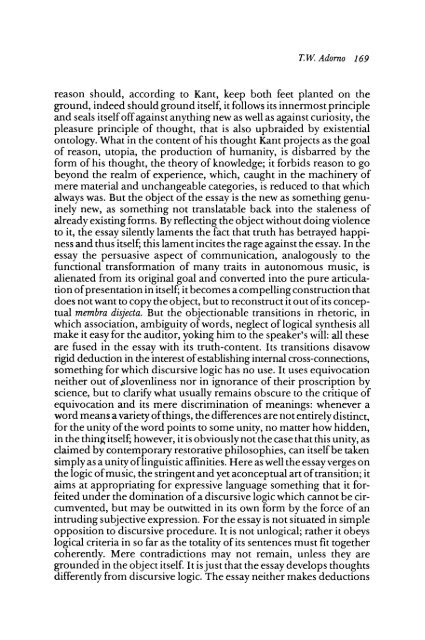Adorno-The-Essay-As-Form
Adorno-The-Essay-As-Form
Adorno-The-Essay-As-Form
You also want an ePaper? Increase the reach of your titles
YUMPU automatically turns print PDFs into web optimized ePapers that Google loves.
eason should, according to Kant, keep both feet planted on theground, indeed should ground itself, it follows its innermost principleand seals itself off against anything new as well as against curiosity, thepleasure principle of thought, that is also upbraided by existentialontology. What in the content of his thought Kant projects as the goalof reason, utopia, the production of humanity, is disbarred by theform of his thought, the theory of knowledge; it forbids reason to gobeyond the realm of experience, which, caught in the machinery ofmere material and unchangeable categories, is reduced to that whichalways was. But the object of the essay is the new as something genuinelynew, as something not translatable back into the staleness ofalready existing forms. By reflecting the object without doing violenceto it, the essay silently laments the fact that truth has betrayed happinessand thus itself; this lament incites the rage against the essay. In theessay the persuasive aspect of communication, analogously to thefunctional transformation of many traits in autonomous music, isalienated from its original goal and converted into the pure articulationof presentation in itself; it becomes a compelling construction thatdoes not want to copy the object, but to reconstruct it out of its conceptualmembra disjecta. But the objectionable transitions in rhetoric, inwhich association, ambiguity of words, neglect of logical synthesis allmake it easy for the auditor, yoking him to the speaker's will: all theseare fused ik the essay with its truth-content. Its transitions disavowrigid deduction in the interest of establishing internal cross-connections,something for which discursive logic has no use. It uses equivocationneither out ofslovenliness nor in ignorance of their proscription byscience, but to clarify what usually remains obscure to the critique ofequivocation and its mere discrimination of meanings: whenever aword means avariety of things, the differences are not entirely distinct,for the unity of the word points to some unity, no matter how hidden,in the thing itself; however, it is obviously not the case that this unity, asclaimed by contemporary restorative philosophies, can itself be takensimply as a unity of linguistic affinities. Here as well the essay verges onthe logic of music, the stringent and yet aconceptual art of transition; itaims at appropriating for expressive language something that it forfeitedunder the domination of a discursive logic which cannot be circumvented,but may be outwitted in its own form by the force of anintruding subjective expression. For the essay is not situated in simpleopposition to discursive procedure. It is not unlogical; rather it obeyslogical criteria in so far as the totality of its sentences must fit togethercoherently. Mere contradictions may not remain, unless they aregrounded in the object itself. It is just that the essay develops thoughtsdifferently from discursive logic. <strong>The</strong> essay neither makes deductions


